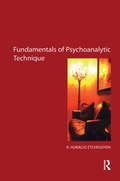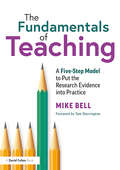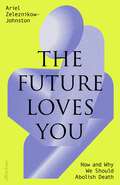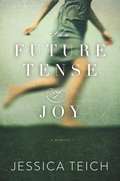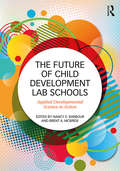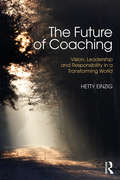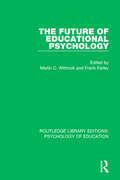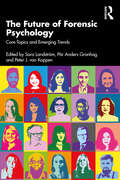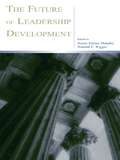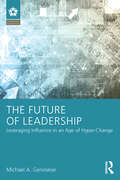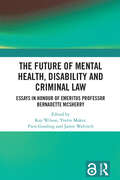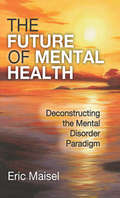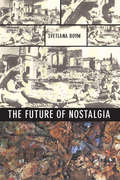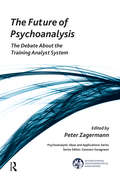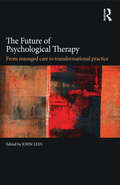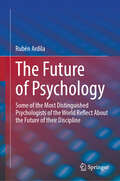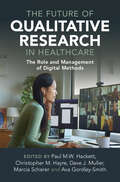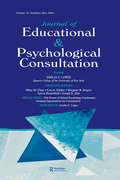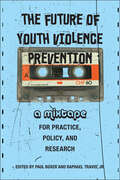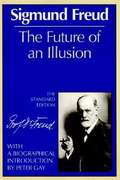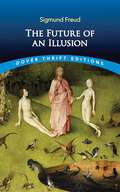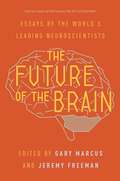- Table View
- List View
The Fundamentals of Psychoanalytic Technique
by R. Horacio EtchegoyenThis book presents the theories and observations of each major contributor to the discussion of psychoanalytic technique and reveals the particular advantages and disadvantages which fall to the various theoretical positions and orientations adopted by each contributor.
The Fundamentals of Teaching: A Five-Step Model to Put the Research Evidence into Practice
by Mike BellTeachers are bombarded with advice about how to teach. The Fundamentals of Teaching cuts through the confusion by synthesising the key findings from education research and neuroscience to give an authoritative guide. It reveals how learning happens, which methods work best and how to improve any students’ learning. Using a tried-and-tested, Five-Step model for applying the methods effectively in the classroom, Mike Bell shows how you can improve learning and eliminate time-consuming, low-effect practices that increase stress and workload. He includes case studies from teachers working across different subjects and age groups which model practical strategies for: Prior Knowledge Presenting new material Setting challenging tasks Feedback and improvement Repetition and consolidation. This powerful resource is highly recommended for all teachers, school leaders and trainee teachers who want to benefit from the most effective methods in their classrooms.
The Future Loves You: How and Why We Should Abolish Death
by Dr Ariel Zeleznikow-JohnstonA brilliant young neuroscientist explains how to preserve our minds indefinitely, enabling future generations to choose to revive usJust as surgeons once believed pain was good for their patients, some argue today that death brings meaning to life. But given humans rarely live beyond a century – even while certain whales can thrive for over two hundred years – it’s hard not to see our biological limits as profoundly unfair. No wonder then that most people nearing death wish they still had more time.Yet, with ever-advancing science, will the ends of our lives always loom so close? For from ventilators to brain implants, modern medicine has been blurring what it means to die. In a lucid synthesis of current neuroscientific thinking, Zeleznikow-Johnston explains that death is no longer the loss of heartbeat or breath, but of personal identity – that the core of our identities is our minds, and that our minds are encoded in the structure of our brains. On this basis, he explores how recently invented brain preservation techniques now offer us all the chance of preserving our minds to enable our future revival.Whether they fought for justice or cured diseases, we are grateful to those of our ancestors who helped craft a kinder world – yet they cannot enjoy the fruits of the civilization they helped build. But if we work together to create a better future for our own descendants, we may even have the chance to live in it. Because, should we succeed, then just maybe, the future will love us enough to bring us back and share their world with us.
The Future Tense of Joy: A Memoir
by Jessica Teich"'No one was less likely to take her own life.’ That’s what her Oxford thesis advisor wrote. From the moment I stumbled across the obituary, late at night when I couldn’t sleep, I was captivated, and it wasn’t the terrible details of her death: That she leapt from the balcony of a high rise in Century City. That she was 27, and a newlywed.” So begins Jessica Teich’s quest to unravel a mystery: the suicide of someone she never met. Bright and accomplished, with a loving family, Jessica knows she should be happy. But a violent childhood has left its mark. Jessica fears she will never be free of her past-until she discovers the obituary of a young woman, whose life is a ghostly echo of her own. Can Jessica discover what drove this brilliant young woman to kill herself? And will discovering the truth save Jessica from the fissures tearing apart her own life? A deeply intimate psychological memoir, The Future Tense of Joy is the luminous account of one woman’s efforts to free herself, and her family, from the demons of the past. Witty, brave and suspenseful, the book has been hailed by Meryl Streep as "beautiful, compassionately imagined.” Steve Martin called it "a daring and intimate journey into the soul of motherhood.”
The Future of Child Development Lab Schools: Applied Developmental Science in Action
by Nancy Barbour Brent A. McBrideChild development laboratory schools are found on college and university campuses throughout the U.S. Over the last century, they have acquired a long, rich history. Originally seen as settings for the new field of child study in the early 1900s, their functions have evolved over time. These programs often play a central role in supporting teaching, research, and outreach/engagement activities in the fields of child development and early childhood education. Yet, many have had to fight for their existence when economic times have gotten difficult. Many long-running programs have had to close. This book provides a unique perspective on the purpose and function of child development laboratory schools and the potential of large-scale research to examine important world problems. The individual stories presented are real stories that offer reasonable solutions and ideas for maximizing the value of these venerable institutions. Most importantly, the authors demonstrate how child development laboratory schools can address the criticisms often lodged regarding their lack of relevancy and focus on real-life problems and solutions. The range of perspectives includes university faculty trying to maximize research that is applied in nature as well as redefining what and where a laboratory is, both in the university and in the community. The message is clear that child development laboratory schools are alive and well, and continuing to evolve.
The Future of Coaching: Vision, Leadership and Responsibility in a Transforming World
by Hetty EinzigWe live in a world that is volatile, uncertain, complex and ambiguous, in which our work and lives are constantly disrupted and changing. But coaches and leaders are still trained to operate within stable models with a uni-focus on performance. Coaches are starting to question the remit of ‘raising performance’ within existing systems, many of which are outdated, dysfunctional and even toxic. The role of the coach today must evolve to become fit for purpose in challenging times and coaching must re-articulate its values, as the essential compass for navigating turbulent waters. In The Future of Coaching, Hetty Einzig examines the role of coaching and leadership in the twenty-first century, and sets out a compelling vision for its future. Drawing on experience gained over twenty-five years of coaching leaders in the corporate and public sectors, in the UK and globally, she challenges the tenet of coaching neutrality. Rather than simply following the client agenda, she encourages coaches to see themselves as partners in courageous leadership and to work towards building an ethical, holistic and networked coaching approach to help create businesses that serve society and our globalised world. The book asks essential questions of coaches working today: how can leaders and coaches become ‘positive deviants’ and transform the rules of the game within cultures where denial and group-think are rife? How can coaches work with the anxious and depressed, embracing the dark as well as the light? Are coaches prepared for the rise of Millennials, women leaders and those over sixty (the Third Acters)? Einzig challenges the model of the Strong Leader in favour of Respons-able leadership based on authentic strength, distributed power and responsive thinking. And she shows how this vision of a transformed workplace is essential for the transformations society must undertake to reclaim a positive future. This thought provoking collection of essays, designed to be read in any order, is enlightening and inspiring reading for coaches in practice and in training, HR and L&D professionals and for leaders everywhere.
The Future of Educational Psychology (Routledge Library Editions: Psychology of Education)
by Merlin C. Wittrock Frank FarleyOriginally published in 1989, this title for the first time in one volume, organized and discussed the fundamental advances in theory, technology, and research methods in educational psychology, at the time. The book provides comprehensive, integrated reviews and discussions of recent advances of the day in such areas as learning, cognition, instruction, and applications to curriculum.
The Future of Forensic Psychology: Core Topics and Emerging Trends
by Pär Anders Granhag Sara Landström Peter J. van KoppenThe Future of Forensic Psychology: Core Topics and Emerging Trends is an authoritative text that presents state-of-the-art research from rising stars in the field. Presented in an accessible way, it draws on cutting-edge research to analyse both core topics and current trends in forensic psychology. Borne out of the internationally recognized House of Legal Psychology doctorate programme, the book features eighteen authors from different international contexts who evaluate current and emerging topics in the field. The book is divided into three sections; eyewitness memory and testimony, investigative interviewing and, deception detection and legal decision making. Each section contains in-depth research and includes classics topics such as factors affecting eyewitnesses and determining deceit in investigations. The book also covers newer exciting developments within the field, including credibility in asylum contexts, alibies and cross-cultural aspect of interviewing. Offering an insightful summary of the field today, this book is an indispensable read for students and researchers of forensic psychology, legal psychology and criminology. It will also be of great interest to practitioners in the judicial system.
The Future of Leadership Development (Applied Psychology Series)
by Ronald E. Riggio Susan Elaine MurphyLeadership in today's organizations is a tough business. Organizational leaders face a number of challenges as their jobs, and the world around them, become increasingly complex. Trends, such as organizational "delayering," rapid technological advances, and increased employee empowerment require that leaders adapt their techniques and styles of leadership to meet these new challenges. Consequently, there has been an explosion of interest in leadership in recent years as researchers and management educators struggle to understand the process of leadership development, how it operates, and what characteristics make effective leaders. Born of these questions, the 11th Annual Kravis-de Roulet Leadership Conference at Claremont McKenna College brought together an impressive slate of scholars whose theories, research, and cutting-edge techniques are now gathered together in this impressive volume. Each chapter asks and answers questions about the current state of the field while providing future direction for research to help bridge the gap between leadership researchers and leadership development practitioners. Notable topics include chapters on "e-leadership" and leadership within the "virtual" organization, exploring 360-degree feedback, the importance of "social capital," and a comprehensive analysis of the well-researched theory of Leader Member Exchange.
The Future of Leadership: Leveraging Influence in an Age of Hyper-Change (Leadership: Research and Practice)
by Michael A GenoveseThe Future of Leadership considers how the rapid changes of today will affect the leaders of tomorrow. Renowned Leadership scholar Michael A. Genovese argues that one of the key challenges for future leaders will be to effectively and constructively manage the ‘hyper-change’ taking place both within organizations and in the broader social and political spheres. Taking a Futures Studies approach to envision the state of leadership in the coming decades, Genovese also provides case studies of leaders who have already demonstrated the mind- and skill-sets necessary to successfully manage rapid change.
The Future of Mental Health, Disability and Criminal Law
by Piers Gooding Yvette Maker Kay Wilson Jamie WalvischThis book brings together contributions from twenty-three world-leading scholars and commentators that address a range of contemporary and pressing international themes in mental health, disability and criminal law. The authors use the work of internationally renowned academic, Emeritus Professor Bernadette McSherry, as a springboard to reflect on recent developments in these areas of law and to anticipate the future directions they may take. In doing so, they aim to inform and inspire a new generation of mental health, disability and criminal law scholars, advocates and reformers. The book is divided into four substantive sections: reforming mental health and disability law; regulating coercion and restrictive practices; improving access to justice and the criminal law; and transforming mental health law. It also includes an introduction from the editors and an afterword from Emeritus Professor McSherry. The book is aimed at regulators, policymakers, lawyers, clinicians, consumer advocates and academics who are interested in the urgent and contentious issues surrounding the reform and development of mental health, disability and criminal law. It will help them understand the key issues and problems and presents suggestions for reform. The book is interdisciplinary and international in its focus.
The Future of Mental Health: Deconstructing the Mental Disorder Paradigm
by Eric MaiselThe Future of Mental Health drills to the heart of the current mental health crisis, where hundreds of millions of individuals worldwide receive unwarranted "mental disorder diagnoses." It paints a picture of how mental health providers can improve their practices to better serve individuals in distress and outlines necessary steps for a mental health revolution. Eric Maisel's goal is to inject more human interaction into the therapeutic process.Maisel powerfully deconstructs the "mental disorder" paradigm that is the foundation of current mental health practices. The author presents a revolutionary alternative, a "human experience" paradigm. He sheds a bright light on the differences between so-called "psychiatric medication" and mere chemicals with powerful effects, explains why the DSM-5 is silent on causes, silent on treatment, and wedded to illegitimate "symptom pictures." Maisel describes powerful helping alternatives like communities of care, and explains why one day "human experience specialists" may replace current mental health professionals.An important book for both service providers and service users, The Future of Mental Health brilliantly unmasks current mental health practices and goes an important step further: it describes what we are obliged to do in order to secure better mental health services and better mental health for everyone.
The Future of Nostalgia
by Svetlana BoymCombining personal memoir, philosophical essay, and historical analysis, Svetlana Boym explores the spaces of collective nostalgia that connect national biography and personal self-fashioning in the twenty-first century. She guides us through the ruins and construction sites of post-communist cities-St. Petersburg, Moscow, Berlin, and Prague-and the imagined homelands of exiles-Benjamin, Nabokov, Mandelstahm, and Brodsky. From Jurassic Park to the Totalitarian Sculpture Garden, Boym unravels the threads of this global epidemic of longing and its antidotes.
The Future of Nursing 2020-2030: Global Applications to Advance Health Equity
by Susan Hassmiller Ashley Darcy Mahoney Kenya BeardThis book provides an application of the concepts and recommendations of The Future of Nursing 2020-2030: Charting a Path to Achieve Health Equity Report, a Consensus Study from the US National Academy of Medicine. It offers complementary guidance through tools, tips, examples and storytelling. As such this book, written by prominent international academics and nurse practitioners, offers program and policy recommendations for health equity. As the world’s largest and most trusted workforce, nurses are in a key position thus must step up to help address these inequities now. The recent pandemic has laid bare these inequities in ways that are stark and demanding of our attention. This book offers program and policy recommendations, along with case studies, designed to empower nurses to understand and ACT to improve health equity. This text provides nurses an opportunity to clearly see the need for an equitable, just, and fair society. There has never been a more urgent call to action.
The Future of Psychoanalysis: The Debate About the Training Analyst System (The International Psychoanalytical Association Psychoanalytic Ideas and Applications Series)
by Peter ZagermannThis book is concerned with the question of what psychoanalytic training should look like today. Should we go on with the system that has developed over time? Or should we abandon it, and if so, for which reasons?It provides a detailed and compelling account of the ongoing, sometimes heated, international debate about psychoanalytic training. After nearly a century since the onset of formal psychoanalytic training in the 1920s in Berlin, experiences with the prevalent Eitingon model are presented and looked at from different perspectives. Experienced psychoanalysts from all the regions of the psychoanalytic world and from different schools of psychoanalytic thought and clinical conceptualizations share their ideas, critique, and on occasion, their diagnoses. Perhaps no other topic of present-day scientific discussion in the field is as prone to evoke more controversial and passionate reactions than the subject of training.
The Future of Psychological Therapy: From Managed Care to Transformational Practice
by John LeesThe psychotherapy and counselling profession has recently experienced far-reaching changes because of the development of evidence-based medicine and managed care systems. The Future of Psychological Therapy brings together leading counsellors, psychotherapists, psychological therapists and managers to address how these changes are beginning to affect all aspects of the psychotherapy and counselling profession. It evaluates the impact of these developments, shows how they affect practitioner’s capacity to care, anticipates future developments and offers a coherent and viable approach to research and practice. The book draws on psychotherapeutic theory to develop insight into managed care and engages in qualitative microphenonena research into the complexities of clinical practice drawing on cutting edge developments. It aims to establish a balanced counselling and psychotherapy profession by: opening up a debate about these far-reaching developments which threaten the profession, challenging the rhetoric of accountability, audit, transparency and measurement of care, exposing the danger of sleeping through these momentous changes in the counselling and psychotherapy profession. The Future of Psychological Therapy is a timely and important book, examining the psychotherapy profession's approach to managed care and evidence-based research, and discussing whether a balanced, coherent and viable counselling and psychotherapy research and practice culture can be established. It will be of interest to practitioners, academics and policy makers in the field, non-clinical professionals and anyone who is interested in psychological therapy and addressing the worldwide deterioration in psychological health.
The Future of Psychology: Some of the Most Distinguished Psychologists of the World Reflect About the Future of their Discipline
by Rubén ArdilaThis book brings together interviews with some of the most distinguished psychologists at the beginning of the 21st century on a world-wide level. It is a reflection about the future of psychology that presents the concepts, ideas, reflections, doubts, dreams and desires of the leaders of psychology at the dawn of the third millennium. Participants are 48 renown psychologists – including former presidents of the American Psychological Association (APA) and former and current presidents of the International Union of Psychological Science (IUPSyS) – from 24 countries: Argentina, Australia, Belgium, Canada, China, Czech Republic, Colombia, Cuba, England, France, Germany, Mexico, The Netherlands, Nigeria, Philippines, Poland, Russia, Singapore, South Africa, Spain, Sweden, Turkey, the United States and Venezuela. The Future of Psychology: Some of the Most Distinguished Psychologists of the World Reflect About the Future of their Discipline will be of interest to both researchers and practitioners from all subfields of psychology who are interested in learning what are the most important challenges and opportunities to psychological research and practice in the 21st century.
The Future of Qualitative Research in Healthcare: The Role and Management of Digital Methods
by Marcia Scherer Christopher M. Hayre Dave J. Muller Ava Gordley-Smith Hackett, Paul M. W.Digital methods in healthcare research have been steadily gaining ground but, until recently, were superseded by conventional face-to-face approaches wherever possible. However, the COVID-19 pandemic rendered in-person forms of data collection largely impossible, propelling digital approaches to the forefront. This book offers a digital lens in the participatory perspective of ethnography, a qualitative methodology. A series of chapters from internationally distinguished and rising authors present digital platforms and techniques and apply these to a wide range of healthcare studies. The authors highlight the different aspects of digital research approaches as well as reflecting on and proffering digital approaches to qualitative research for the future. Will these new digital health techniques be embraced, or will researchers be keen to revert to the traditional methods? With its unique approach, this is an invaluable resource for both prospective and experienced qualitative researchers in a broad array of medical and health disciplines.
The Future of School Psychology Conference: Framing Opportunties for Consultation: A Special Double Issue of the Journal of Educational and Psychological Consultation
by Emilia C. LopezFirst published in 2005. This Volume 15, numbers 3 and 4 of the Journal of Educational and Psychological Consultation 2004 and has the future of school psychology conference- ‘framing opportunities for Consultation' as its special focus.
The Future of Training in Psychotherapy and Counselling: Instrumental, Relational and Transpersonal Perspectives
by John RowanThe Future of Training in Psychotherapy and Counselling presents a revealing and stimulating account of the current state of training that demonstrates how training will have to adapt if it is to sucessfully meet the needs and challenges of the future.In an attempt to look afresh at the whole question of training, John Rowan proposes that there are three ways of doing therapy and any examination of training has to consider each of these:* the instrumental, where the main emphasis is on the treating the client or patient * the authentic way, where the main emphasis is on meeting the client or patient* the transpersonal way, where main emphasis is on linking with the client in a more personal way. Each approach makes different assumptions about the self, about the relationship, and about the level of consciousness involved in doing therapy. By challenging the basic precepts of traditional training, John Rowan encourages the reader to reconsider subjects including the difference between counselling and psychotherapy, culture and ethics, the origins of disturbance in clients, and child development. The Future of Training in Psychotherapy and Counselling provides a much needed new perspective that will compel all psychotherapists and counsellors to take a closer look at training in the field.
The Future of Workplace Fear: How Human Reflex Stands in the Way of Digital Transformation
by Steve PrenticePeople who discuss digital transformation often focus on new technology with a presumption that the working population will embrace it enthusiastically. But human beings are still instinctively dominated by fear, a single complicating reflex which will always be the default response.Workplace fear comes in many forms, including the fear of change, the fear of looking stupid, and the fear of working relationships, and in all cases these fears have deep roots that extend far below having to learn a new technology. It’s about the fear of losing a job, a livelihood, and an identity.The results of such fear can have enormous repercussions on an organization, including increased vulnerability to ransomware and cyberattack, increased employee turnover, loss of competitiveness, loss of market share, resistance, sabotage, discrimination, and litigation.Steve Prentice is an expert in the relationship between people, technology, and change. This book will demonstrate to managers and employees alike the various types of fear that can occur in the workplace in the context of digital transformation, how these fears can impact productivity, team dynamics, and corporate health, and most importantly, how to overcome them.Using case studies of digital transformation successes and failures, Steve describes:How fear grows in the body and mindHow fear radiates and spreads through groups and teamsHow fear interacts with technology, change, and digital transformationHow ignoring or suppressing fear leads to tangible risks to an organization’s futureHow to address and manage fear individually and as a groupHow the demands of modern employees have changedHow managers can prepare themselves for the new normalWho This Book Is For Managers who wish to look under the hood and understand how people respond to the changes in their immediate world, and why most of those responses are negative. It will also be an uplifting read for individual employees who seek to understand why they, or their colleagues or managers, generally respond negatively to changes, or who struggle with conflict and relationships in the workplace and how to create an action plan to improve the situation.
The Future of Youth Violence Prevention: A Mixtape for Practice, Policy, and Research
by Jean Rhodes Jorja Leap Karen L. Bierman Joel M. Caplan Neal Halfon Demetrius Smith Raymond W. Novaco Jonathan Jay Stephanie Bonne Janice Johnson Dias Stanley J. Huey Jaleel Abdul-Adil Elizabeth S. Barnert Fiorella L. Carlos Chavez Liza Chowdhury Isaias Contreras Zion Crichlow Katrina J. Debnam Robyn D. Douglas Noni K. Gaylord-Harden Alejandro Gimenez-Santana Cheryl Grills Matthew Hagler Casey Keene Katherine Kelton Jill Kochanek Joyce Lee Marsha Levick Krista Mehari Shenna Morris Sierra Mullan Corey Prachniak-Rincón Peter H. Rej Joseph B. Richardson Emily N. Satinsky Ashli J. Sheidow Rebecca Slotkin Claire Terrebonne William Wical Samson StylesThe Future of Youth Violence Prevention: A Mixtape for Practice, Policy, and Research focuses on innovative approaches to youth violence prevention that utilize consistent principles found within existing best practices but are dynamic and adaptable across settings—and the sociohistorical and cultural realities of those settings. This book features scholars anchored in applied practices who can ground these forward-thinking strategies in the substantive base of research and theory that has produced successful interventions across multiple disciplines. The scholarship and cutting-edge thinking assembled in this volume could produce new-era youth violence prevention coordinators prepared to serve in any setting—including community outreach programs, therapeutic group homes, day reporting centers, juvenile probation offices, schools, or clinics. These coordinators will be able to cocreate intervention techniques using core prevention elements drawing from a range of ideas and a multitude of disciplines while embracing the assets and resources already in place.
The Future of an Illusion
by Sigmund Freud James StracheyIn the manner of the eighteenth-century philosopher, Freud argued that religion and science were mortal enemies. Early in the century, he began to think about religion psychoanalytically and to discuss it in his writings. The Future of an Illusion (1927), Freud's best known and most emphatic psychoanalytic exploration of religion, is the culmination of a lifelong pattern of thinking.
The Future of an Illusion (Dover Thrift Editions: Psychology)
by Sigmund FreudIn The Future of an Illusion, Freud’s psychoanalysis of religion is the culmination of a lifelong thought pattern. Freud examines human nature and the role of religion in society, proclaiming that human instincts are destructive to civilization and must be restrained to maintain an orderly society. Religion, viewed as a set of false beliefs based on human desires, manifests as a God-like father figure to a helpless child, whose survival is dependent upon delusional beliefs for independence, security, and incentives for good behavior. Declaring religion and science as mortal enemies, Freud concludes that civilization can only be redeemed through new constructions of existence and ideas motivated by science.
The Future of the Brain: Essays by the World's Leading Neuroscientists
by May-Britt Moser Edvard I. MoserThe world's top experts take readers to the very frontiers of brain scienceIncludes a chapter by 2014 Nobel laureates May-Britt Moser and Edvard MoserAn unprecedented look at the quest to unravel the mysteries of the human brain, The Future of the Brain takes readers to the absolute frontiers of science. Original essays by leading researchers such as Christof Koch, George Church, Olaf Sporns, and May-Britt and Edvard Moser describe the spectacular technological advances that will enable us to map the more than eighty-five billion neurons in the brain, as well as the challenges that lie ahead in understanding the anticipated deluge of data and the prospects for building working simulations of the human brain. A must-read for anyone trying to understand ambitious new research programs such as the Obama administration's BRAIN Initiative and the European Union's Human Brain Project, The Future of the Brain sheds light on the breathtaking implications of brain science for medicine, psychiatry, and even human consciousness itself.Contributors include: Misha Ahrens, Ned Block, Matteo Carandini, George Church, John Donoghue, Chris Eliasmith, Simon Fisher, Mike Hawrylycz, Sean Hill, Christof Koch, Leah Krubitzer, Michel Maharbiz, Kevin Mitchell, Edvard Moser, May-Britt Moser, David Poeppel, Krishna Shenoy, Olaf Sporns, Anthony Zador.
